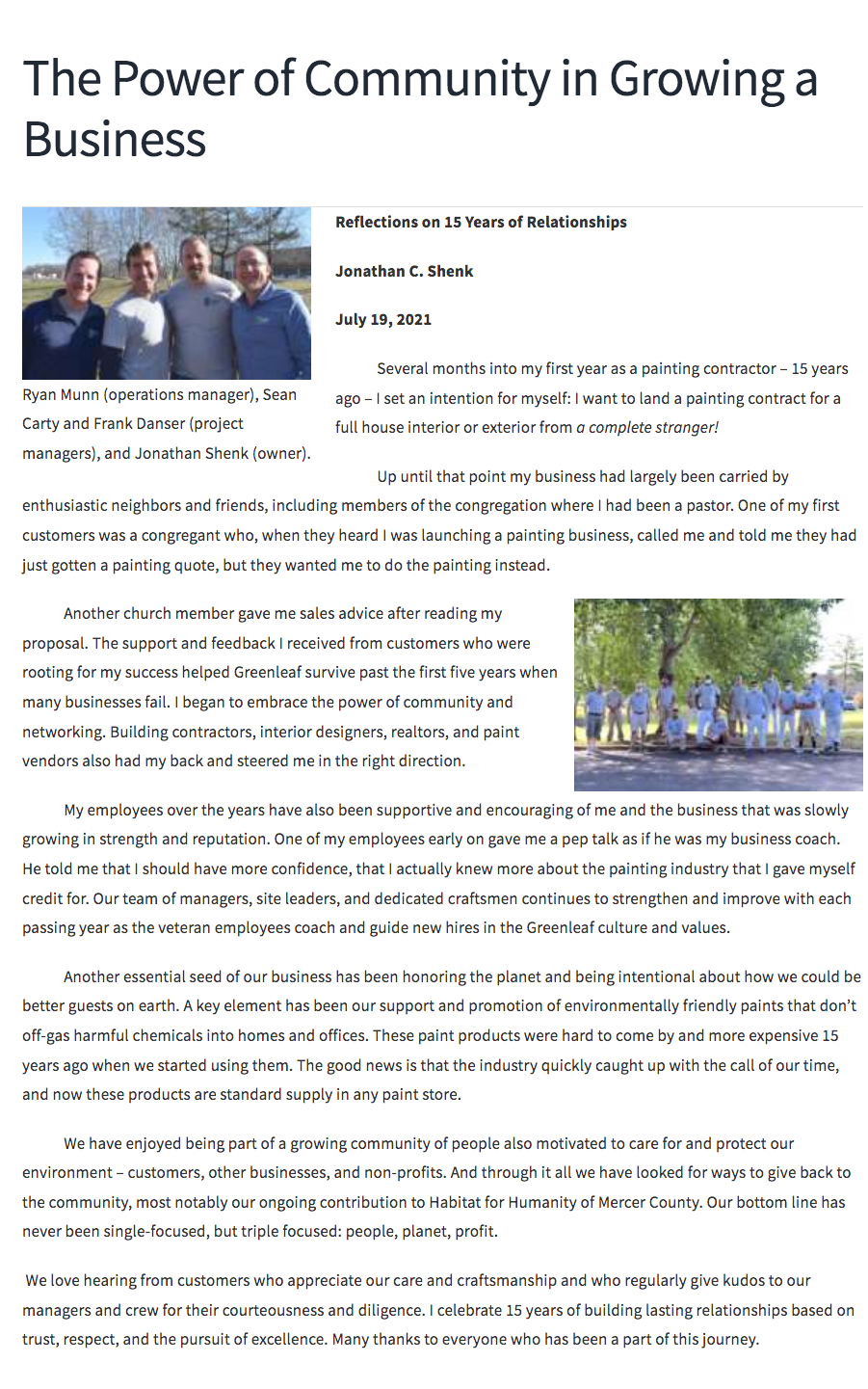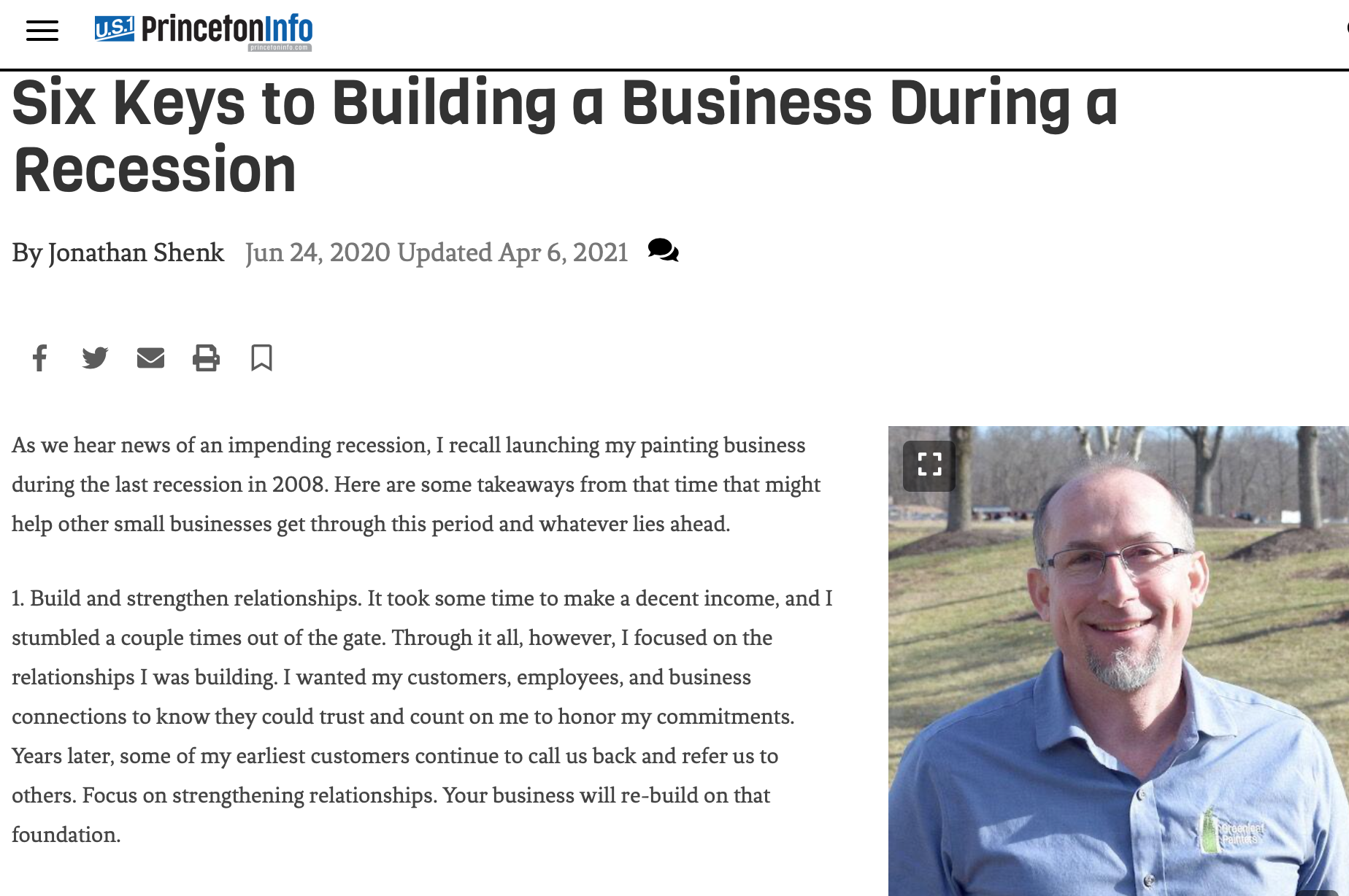
Check out the article here!


When I started my painting business 16 years ago, I had no idea that it would grow to the stature our company is today. Building a company to become a sustainable business enterprise is a heavy lift and finding the right people to do it with you can be one of the biggest challenges. However, I was determined early on to reach out and bring in others who shared my vision, and who could help share the load.
As my company continued to expand and grow from a one- or two-person operation, I brought in people with a variety of temperaments and personalities. I determined to create a work culture in which:
+ both employees and customers were treated with dignity and respect.
+ the work/life balance of my employees would be honored and encouraged.
+ our hard work would become an opportunity to excel, to enjoy working together, and to experience the satisfaction of a job well done.
I quickly realized as an employer that an employee being skilled as a painter or manager was only one of several attributes I valued. I started thinking in terms of a three-legged stool, where each leg is essential for the stool to stand. I wanted people who were:
Leg #1: skilled painters
Leg #2: team players
Leg #3: a person of integrity
I began hiring differently, looking for all three attributes, while also having one-to-one conversations with any current employee who I felt could strengthen one of these areas. Someone whose skilled painter leg needs some strengthening is easier to train than someone who lacks integrity or doesn’t know how to work well with others.
Over the years Greenleaf Painters has grown and flourished, and these fundamentals have helped shape the company culture and have contributed to its prosperity. Sometimes, of course, I wish there were fewer things I needed to learn from scratch, fewer challenges when it came to figuring out how to find the best employees and retain them. However, it is true that with each challenge we gain some new insight which, in turn, makes us better and stronger. I am thankful every day for my wonderful team of dedicated managers and painters.
If you are a budding entrepreneur, or you are growing an existing business, I hope this inspires you to reach the next level with your team.
-Jonathan C. Shenk

Greenleaf’s owner, Jonathan Shenk, had the incredible opportunity to speak at Kampala University in Uganda, East Africa, in 2018, on the lessons he has learned in building his company. He shared these same principles in a talk at the Princeton Corridor Rotary Club in 2019. Now a year later, we want to share them with you because they apply not only to business but to life in general. You may also learn more about Jonathan and this company in the process. Here is a condensed version of his talk.

1. Every person has inherent dignity and worth.
We live in a diverse part of the world. It is not our place to judge someone’s culture or faith or to envy their wealth or to criticize their choices. It is also important that we don’t even entertain those thoughts in our heads because our attitudes influence our relationships with our customers. People can feel judged without any words being said. Therefore, it is much simpler to avoid judging in the first place.
2. Every company has a soul.
Each company is like a living, breathing eco-system. And the company’s soul flows through each employee. It also flows through the company’s work space and equipment. Whatever values a company lifts up will be experienced by anyone who interacts with the company. And the company will only function properly if every part of the company is in agreement with those values.

3. Words have meaning.
Words are powerful and need to be aligned with our actions and attitudes. It is important to hold to the commitments we make to our customers and to each other. Words also create and shape our reality. Do our words suggest an attitude of despair or of hope? Do they suggest an attitude of weakness or of strength?
4. Take the long view.
A company’s principles and values take priority over the bottom line. They take priority over making profits on a particular job. In many businesses there will be profitable seasons and un-profitable seasons. There will be profitable jobs and un-profitable jobs. It’s important to take the long view and focus primarily on doing a great job.

5. Practice gratitude and humility.
–Humility: we are all fallible human beings. We make mistakes. Sometimes we don’t know what choice to make or we don’t have all the information or knowledge we need to make the correct choice. The best leaders and the best companies take a team approach. And they demonstrate compassion and kindness when mistakes are made. If your team is terrified of making mistakes, then they are less likely to aspire to their full potential.
–Gratitude: it is important to walk with a spirit of gratitude as a leader, and to focus on the good things that are happening. It is a choice one needs to make, a choice of perspective and attitude. There are many challenges and difficulties that go along with leadership. It would be easy to fill one’s day with worry and anxiety. That will usually lead someone down further and further into fear and despair. It is better to choose to focus on the good things that are happening.
Thank you for reading!